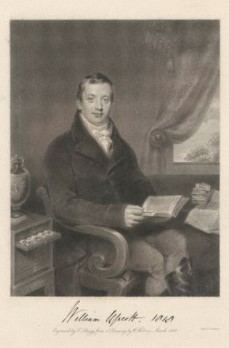The Diary of William Upcott
Introduction:
The project, led by Professor Mark Philp and involving two of the Department's undergraduates (Aysuda Aykan and Curtis Leung), is transcribing and editing the diary of William Upcott (1779-1845), an antiquarian and librarian who lived most of his adult life in London. The material includes extensive reporting of his activities between 1806 and 1810; a tour of the Midlands and Peak District in 1823, and some autobiographical reflections in letters to others.
"Not a soul did I meet beyond Kislingbury, and I had to find my way thro' the village without a guide, and without knowing exactly whither to desist my steps. - I was already tired, - and grown weary with my present situation. By accident, a young girl at a window directed me to the spot, - and how happy was I on opening My Aunts door to find they were sitting up for me, - poor woman! with what pleasure did she receive me! - with what delight was I welcomed into that part of the country. - It seems she had got my Letter, but had almost given me up for that evening. - A young Man was sitting by her, and an old servant (Helen) was sleeping in the chair. All was bustle in a moment, - "What wouldst thee like" was the cry. - Nothing but rest was necessary, - and after talking over the disagreeables of the day, &c, - each betook themselves to their several apartments."
To continue reading this excerpt of the diary, click here.
The length of the diary provides a great insight into Upcott’s character development. In the earlier entries Upcott is apprehensive about his standing in life in terms of his academics and personal relations. He often compares himself to other men and is quite analytical in terms of categorising what he perceives to be as success. However, Upcott’s insecurities quickly turn into admiration for the people he is surrounded by. This provides an insight into late eighteenth and early nineteenth century conceptualisations of the individual and how one perceives themselves. The diary's authenticity and Upcott's views on courtship are among the themes discussed by the team.
The transcription of the diary was all done on a transcription software called Transkribus. Transkribus is an AI-powered handwriting text recognition software that is used for digitising historical documents. For this project, around 50 pages were manually transcribed by the team, before a model of Upcott's handwriting was created on Transkribus. The model is used by Transkribus to recognise Upcott's handwriting, meaning the rest of the material did not need to be manually transcribed.
Find out more about Transkribus and the team's experience of it here.


